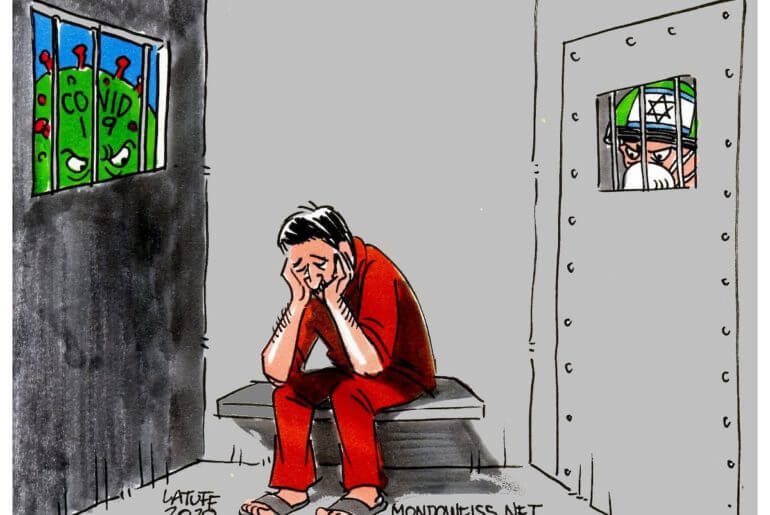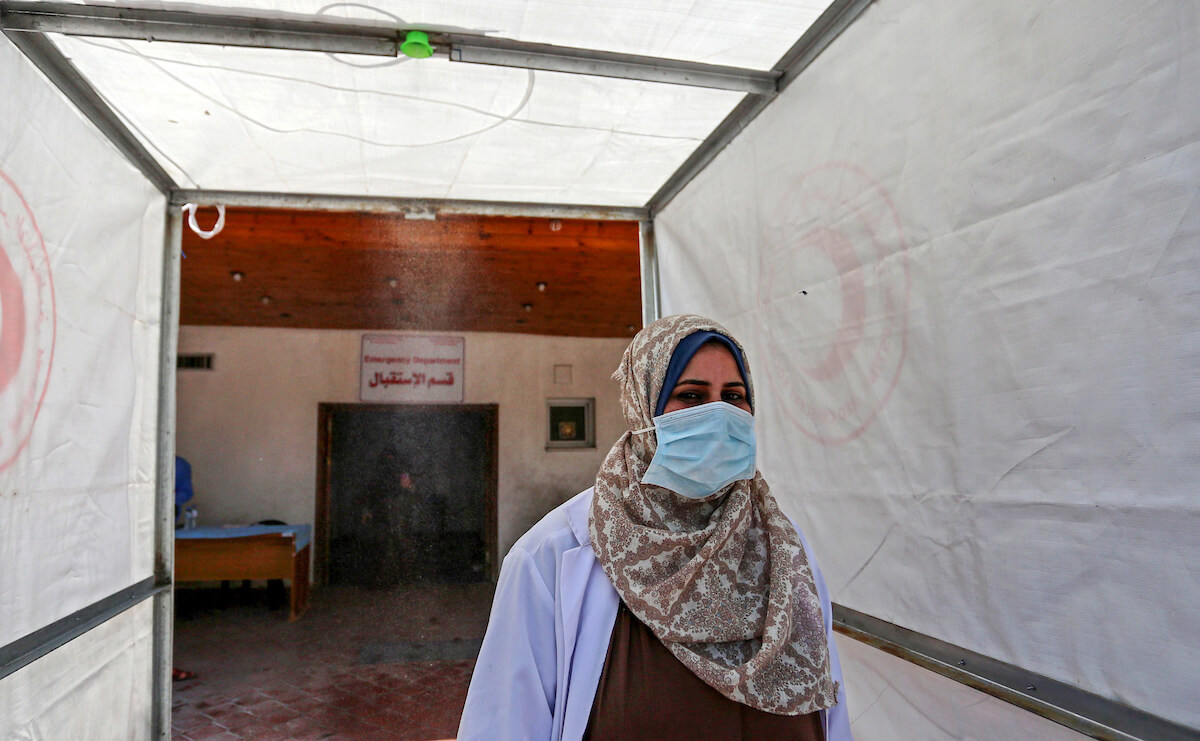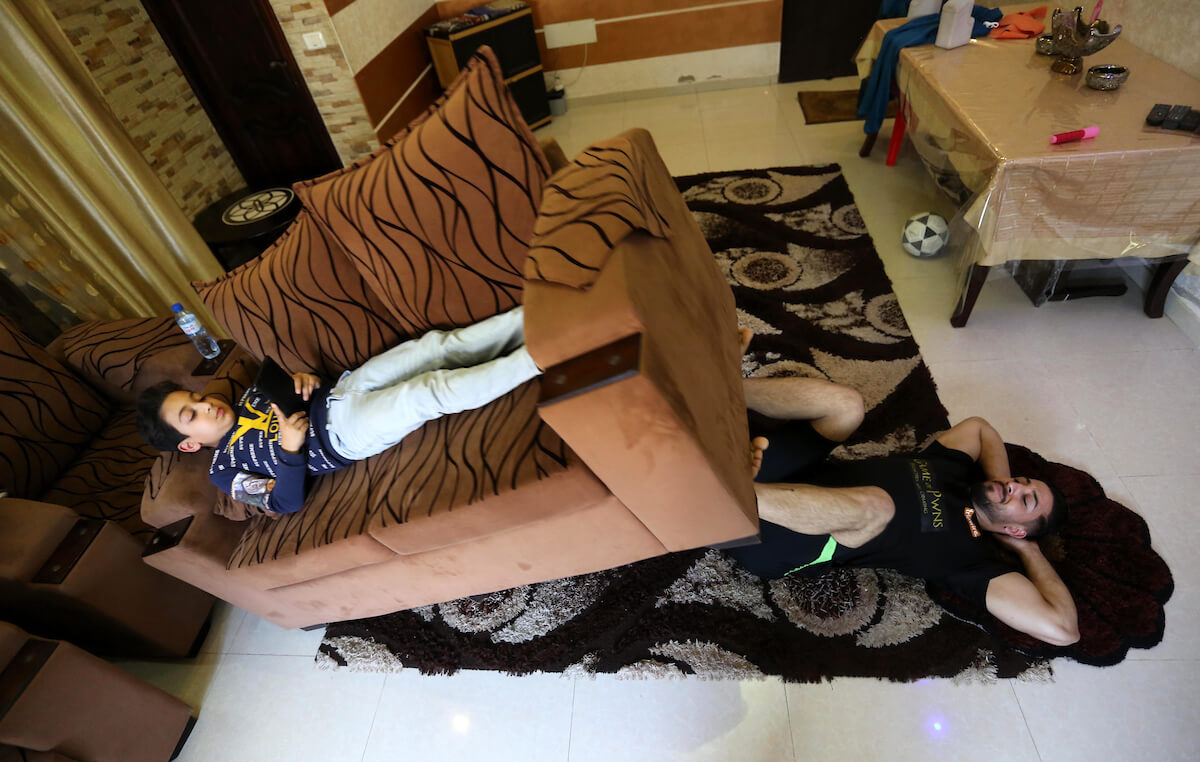Palestinian Prisoners and the Coronavirus
 Saturday, April 18, 2020 at 12:01AM
Saturday, April 18, 2020 at 12:01AM https://mondoweiss.net/2020/04/palestinian-prisoners-and-the-coronavirus/
17 April. 2020. Mondoweiss
 PALESTINIAN PRISONERS CAUGHT BETWEEN ISRAEL AND COVID-19 (CARTOON: CARLOS LATUFF)
PALESTINIAN PRISONERS CAUGHT BETWEEN ISRAEL AND COVID-19 (CARTOON: CARLOS LATUFF) The Latest:
- 307 Palestinians have tested positive for the coronavirus in the West Bank and Gaza.
- 69 people have recovered; 2 have died.
- 100 of those who tested positive work inside of Israel, or in Israeli settlements in the West Bank.
- 7 healthcare workers in the West Bank and Gaza have tested positive for COVID-19.
- Over 12,800 have tested positive in Israel for COVID-19; at least 148 have died.
- NYT reports worldwide, COVID-19 cases pass the 2 million mark.
The Coronavirus Under Lockdown
April 17th is Palestinian Prisoner Day, where Palestinians from across the occupied territory reminder of the plight of thousands of Palestinians imprisoned in Israeli military jails.
Since the start of this year, Israel has detained 1,324 Palestinians, including 210 minors and 31 women, according to a joint statement from local prisoners rights groups.
This has not been deterred by COVID-19.
Since the coronavirus outbreak began on March 5th, Israeli forces have continued their arrest raids in the West Bank and East Jerusalem unhindered, detaining 357 Palestinians, among them 48 minors and four women.
Palestinian leaders and activists used the occasion of Palestinian Prisoner Day today to double down on calls to release Palestinian prisoners, particularly those with health issues and chronic illnesses. And Palestinian activists worldwide are using the day to make connections to other prisoner struggles.
COVID-19 Hits Dheisheh Refugee Camp
The first case of coronavirus in a refugee camp was confirmed this week in Bethlehem’s Dheisheh refugee camp. Two cases were confirmed in the camp, both of whom are Palestinain medics who reportedly worked in Jerusalem and recently returned home to Bethlehem. Immediately after they tested positive, Palestinian police implemented a total shutdown on Dheisheh camp, which is home to more than 15,000 Palestinian refugees.
Bethlehem is home to three Palestinian refugee camps. Ever since the outbreak began in the city last month, activists have expressed concerns over the potentially devastating effects the virus would have on the camps, which are overpopulated, overcrowded, and suffer from poor electricity and water supply.
Tested To The Limit
 PALESTINIANS WALK THROUGH A STERILIZATION CHAMBER SET UP AT RED CRESCENT HOSPITAL AS A PREVENTIVE MEASURE AMID FEARS OF THE SPREAD OF THE CORONAVIRUS IN KHAN YUNIS, APRIL 15, 2020. (PHOTO: ASHRAF AMRA/APA IMAGES)
PALESTINIANS WALK THROUGH A STERILIZATION CHAMBER SET UP AT RED CRESCENT HOSPITAL AS A PREVENTIVE MEASURE AMID FEARS OF THE SPREAD OF THE CORONAVIRUS IN KHAN YUNIS, APRIL 15, 2020. (PHOTO: ASHRAF AMRA/APA IMAGES)
Aaron Lakoff has interviewed a series of Palestinians for dispatches published by Independent Jewish Voices Canada. He’s been reaching out to healthcare workers on the front lines, journalists, and professors. We republished his interview with Asmaa Tayeh, conducted just after her 24th birthday as the writer was preparing to go into self-isolation with her family.
She spoke earnestly about her fears over the coming weeks. Gaza, she said, is already isolated making the prospect of being cooped up on the house feel even more restricted.
Asmaa Tayeh: “I actually wanted to stay home, to be honest, but it’s so hard. We’re not used to this. The Gaza Strip is the only area where we can go. We can’t go outside of it. So how can we cope with not moving around inside of it? We can’t just lock ourselves inside our rooms and get used to it. I know it’s hard for other people around the world right now, but it’s much harder for us.”
Jonathan Cook is predicting Gaza could be on the precipice of a disaster. The Strip has made robust efforts to quarantine Palestinians returning from abroad, but the shortages have finally caught up to healthcare workers.
Cook reports, “It is known to have spread to more than a dozen people so far, though doctors have no idea of the true extent. Testing equipment ran out days ago. Unless Gaza enjoys a miraculous escape, an epidemic is only a matter of time. The consequences hardly bear contemplating.”
Empty Streets
 A VIEW SHOWS STREETS ALMOST DESERTED DURING THE HOME CONFINEMENT ORDER AS A PRECAUTION AGAINST THE SPREAD OF THE CORONAVIRUS DISEASE (COVID-19) IN THE EAST JERUSALEM NEIGHBORHOOD OF BEIT HANINA ON APRIL 15, 2020. (PHOTO: MUHAMMED QAROUT IDKAIDEK/APA IMAGES)
A VIEW SHOWS STREETS ALMOST DESERTED DURING THE HOME CONFINEMENT ORDER AS A PRECAUTION AGAINST THE SPREAD OF THE CORONAVIRUS DISEASE (COVID-19) IN THE EAST JERUSALEM NEIGHBORHOOD OF BEIT HANINA ON APRIL 15, 2020. (PHOTO: MUHAMMED QAROUT IDKAIDEK/APA IMAGES)
“Ramadan is less than 10 days away, and the streets of Palestine are unrecognizable,” Mondoweiss’s Yumna Patel reports. While Muslims usually pray in mosques during the month-long holiday, most houses of worship in the region are already shuttered to prevent any further spread of the coronavirus. Reports coming out of Gaza, where there has been no cases of community transmission outside of government-run quarantine facilities, show people are still gathering to pray, although in small numbers and increasingly with face masks.
This week Patel spoke with the Bethlehem’s mufti, Sheikh Abed al-Majid Amarna about the upcoming holiday: “People are feeling very sad that Ramadan is coming soon and the mosques are still closed,” Amarna said, adding that he has received dozens of calls from worshipers over the past few days asking if the mosque will be opened for the holy month.
“I feel really bad about it, but I have to tell them that our mosques are likely going to be closed,” Amarna said, adding that during Ramadan mosques are not only places of worship, but places where people come to socialize and spend time with one another.”
Are You There Reader, It’s Me, Your Book List
Most of us are still self-isolating and will continue to do so for the next few weeks at least. Michael Arria has put together another list of titles to fill your time. Check your local library, lots are posting access to their reservoir of e-books and audiobooks.
Arria writes, “At the beginning of this month, we recommended 10 books on Palestine/ Israel to read while social distancing. Since we remain indefinitely stuck indoors, here’s another 10.”
Odds & Ends
 PALESTINIAN FITNESS TRAINER AND BODYBUILDING, AHMED AL-SAWI TRAINS AT HIS HOME AS A PREVENTIVE MEASURE AMID FEARS OF THE SPREAD OF THE NOVEL CORONAVIRUS DISEASE (COVID-19) IN GAZA CITY ON APRIL 4, 2020. PHOTO BY ASHRAF AMRA/APA IMAGES
PALESTINIAN FITNESS TRAINER AND BODYBUILDING, AHMED AL-SAWI TRAINS AT HIS HOME AS A PREVENTIVE MEASURE AMID FEARS OF THE SPREAD OF THE NOVEL CORONAVIRUS DISEASE (COVID-19) IN GAZA CITY ON APRIL 4, 2020. PHOTO BY ASHRAF AMRA/APA IMAGES
🏋🏽 Like everyone, Palestinians are experimenting with home fitness. Above, Palestinian bodybuilder Ahmed al-Sawi is getting particularly creative as he leg presses his son in their Gaza City home as his son enjoys screen time on a sofa.
📺 There is a webinar that is sure to be interesting coming up on April 27th — “Occupation is an Underlying Condition: The Political Economy of COVID-19 in Palestine” organized by Who Profits. It will be discussing the organization’s new report on how the Israeli occupation is exploiting the coronavirus crisis which we covered here. You can sign up for the webinar here.
Links Of Interest
- Conversation with Matthias Schmale, UNRWA Director on impact of COVID19 in Gaza – 14 April 2020 (UN General Assembly’s Palestinian Rights Committee)
- In Palestine, COVID-19 Meets the Israeli Occupation (Al-Shabaka)
- Apartheid in the time of corona (Mondoweiss)
- From Palestine to the U.S., coronavirus exposes institutional racism (Mondoweiss)
 APJP |
APJP |  Post a Comment |
Post a Comment |